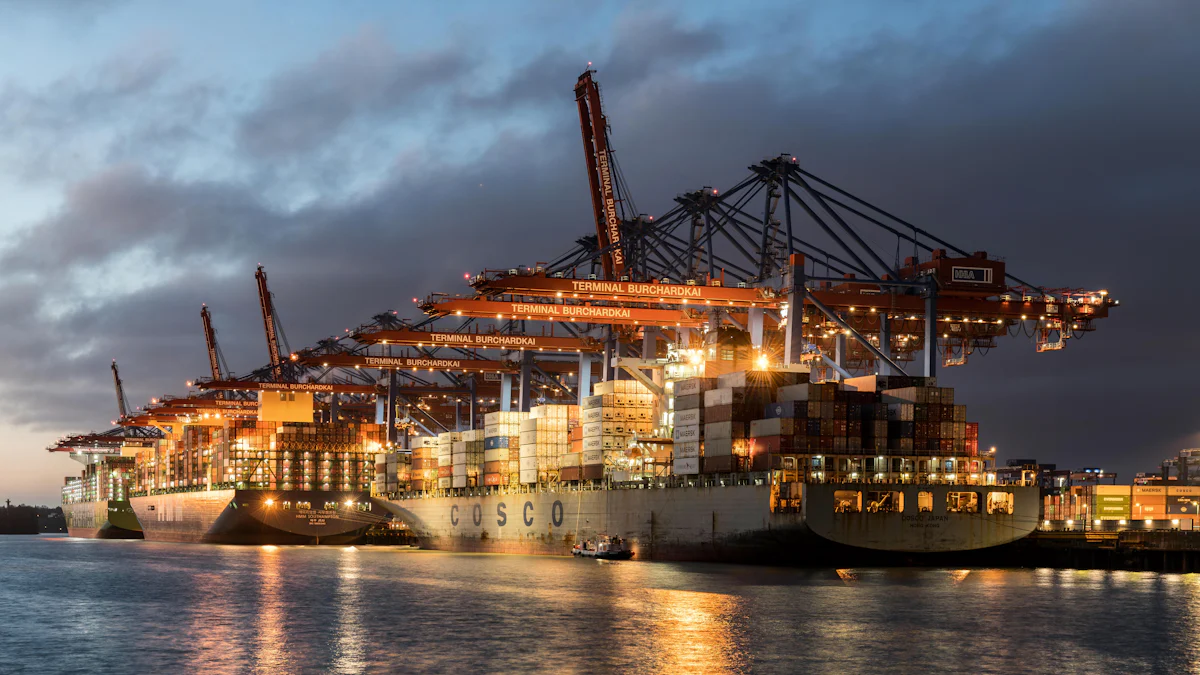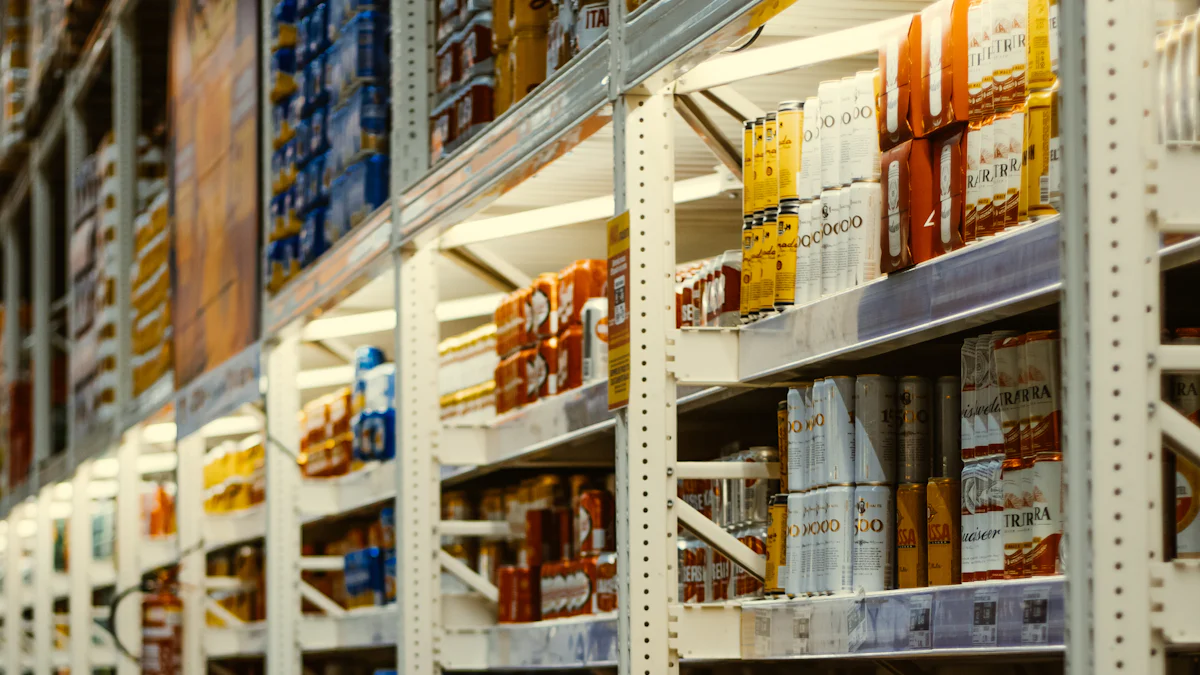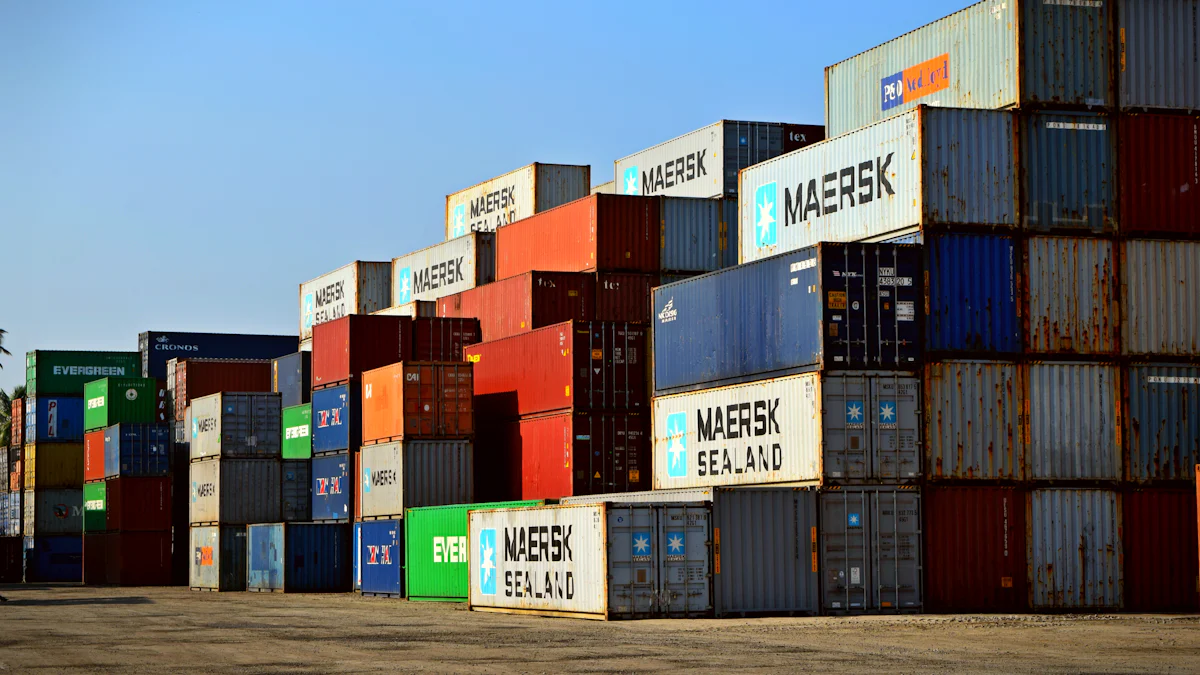How to Select the Best Overseas Warehousing Service for Your Business

Choosing the right overseas warehousing services is vital for ensuring a successful supply chain. Efficient warehousing directly impacts your ability to achieve timely delivery, reduce costs, and enhance customer satisfaction. A well-optimized warehousing solution not only supports your business growth but also strengthens your competitive edge. By partnering with a reliable logistics company or third-party logistics provider, you can streamline operations and focus on core business activities. Selecting your warehousing solution carefully ensures that your business benefits from the best logistics services tailored to your needs.
Key Takeaways
Assess your specific storage and distribution needs to choose a warehouse that aligns with your operational goals.
Select a warehouse location that is close to key markets and transportation hubs to enhance delivery speed and reduce costs.
Prioritize providers that offer advanced technology for real-time tracking and inventory management to improve operational efficiency.
Ensure the warehousing solution is scalable and flexible to adapt to seasonal demand and business growth.
Evaluate the total cost structure, including hidden fees, to ensure you select a cost-effective warehousing solution.
Verify the provider's security measures and compliance with local regulations to protect your inventory and maintain smooth operations.
Research customer reviews and assess the responsiveness of potential providers to ensure reliable service and support.
Identifying Your Business Needs for Overseas Warehousing Services
Understanding your business needs is the first step in selecting the right overseas warehousing services. A clear assessment ensures that the warehousing solution you choose aligns with your operational goals and supports a successful supply chain. By focusing on your specific requirements, you can make informed decisions and avoid unnecessary complications.
Understanding Storage and Distribution Requirements
To choose a warehouse facility that fits your business, start by evaluating your storage and distribution needs. Consider the type of products you handle. Are they perishable, fragile, or require special conditions like temperature control? Knowing these details helps you identify facilities equipped to manage your inventory effectively.
Next, assess the volume of goods you plan to store. A facility should accommodate your current inventory while allowing room for growth. For businesses with fluctuating demand, flexibility in storage space is crucial. This ensures you can scale operations during peak seasons without disruptions.
Distribution requirements also play a key role. Proximity to transportation hubs, such as ports, airports, and major highways, reduces transit times and costs. A strategically located international warehouse service ensures faster delivery to your customers, enhancing satisfaction and loyalty.
"Customization of warehousing solutions to meet specific business needs is essential for operational efficiency," according to industry experts. Tailored services, such as real-time tracking or specialized handling, can further streamline your logistics operations.
Aligning Warehousing Solutions with Business Goals
Your warehousing solution should align with your broader business objectives. Begin by identifying how the facility can support your goals. For instance, if you aim to expand into new markets, choose a warehouse facility near those regions. This minimizes shipping times and positions your business closer to potential customers.
Cost efficiency is another factor to consider. While evaluating options, look beyond the cost per square foot. Factor in transportation expenses, labor costs, and any additional fees. A comprehensive cost analysis ensures you select a solution that delivers long-term value.
Collaboration with a reliable logistics company can also enhance your operations. Their expertise in international warehousing services ensures compliance with local regulations and smooth handling of cross-border logistics. This partnership allows you to focus on core activities while maintaining an efficient supply chain.
Finally, gather feedback from existing clients of the warehousing provider. Positive testimonials often indicate reliable service and efficient operations. As one expert noted, "Understanding market position and learning from successful case studies are crucial for refining warehousing solutions." This insight helps you make a confident choice.
Evaluating Location and Accessibility of International Warehousing Services

Selecting the right location for your overseas warehousing services plays a critical role in optimizing your supply chain. A well-placed warehouse ensures faster delivery, reduced costs, and improved customer satisfaction. By focusing on location convenience and accessibility, you can enhance your warehouse logistics management and streamline operations.
Proximity to Key Markets and Transportation Hubs
The physical location of your warehouse significantly impacts your business efficiency. Warehouses near key markets allow you to serve customers faster and reduce last-mile delivery costs. For example, being close to densely populated areas can help you benefit from economies of scale, as these regions often have higher demand and better infrastructure.
Proximity to suppliers also matters. A warehouse located near your suppliers minimizes inbound transportation expenses and ensures a steady flow of inventory. This setup reduces delays and helps maintain optimal stock levels. Additionally, having regional warehouses allows you to monitor inventory levels more closely and fulfill orders faster.
"Warehouses closer to customers and suppliers not only cut transportation costs but also enhance supply chain efficiency," according to industry experts. This strategic positioning ensures that your business remains competitive in a fast-paced market.
When evaluating potential locations, consider the balance between operational costs and accessibility. While urban areas may offer better connectivity, they often come with higher rental costs. Weigh these factors carefully to find a location that aligns with your budget and operational goals.
Accessibility to Ports, Airports, and Major Transport Routes
Good transport links are essential for effective warehouse logistics management. Warehouses near ports, airports, and major highways provide seamless access to transportation services, reducing transit times and costs. This accessibility is especially important for businesses involved in international warehousing services, where cross-border logistics require efficient coordination.
For instance, a warehouse near a major port simplifies the import and export process. It reduces the time needed for customs clearance and ensures quicker delivery to international markets. Similarly, proximity to airports facilitates faster air freight services, which is crucial for time-sensitive shipments.
Road and rail connectivity also play a vital role. Warehouses located near major highways or rail hubs ensure smooth distribution to various regions. This setup minimizes delays caused by poor road conditions or limited transport options. By choosing a location with robust transportation services, you can maintain a reliable supply chain and meet customer expectations.
"Access to major transport routes enhances the efficiency of warehouse operations and ensures timely delivery," as highlighted by logistics professionals. This factor is crucial for businesses aiming to expand their global reach.
When assessing a warehouse's accessibility, evaluate the quality of nearby infrastructure. Reliable transportation services and well-maintained roads contribute to smoother operations and lower logistics costs. A strategically located warehouse not only supports your current needs but also accommodates future growth and market expansion.
Assessing Technology and Integration in Your Warehousing Solution
Technology plays a crucial role in modern warehousing, especially when managing overseas operations. Advanced systems ensure seamless integration with your existing processes, enhancing operational efficiency and reducing errors. By leveraging the right tools, you can gain better control over your inventory and streamline your supply chain.
Real-Time Tracking and Inventory Management Systems
Real-time tracking and inventory management systems are essential for effective warehouse operations. These systems provide constant visibility into stock levels, order statuses, and shipment details. With this information, you can make informed decisions and avoid stockouts or overstocking.
For instance, JUSDA Cloud Warehousing Solutions integrates cloud technology to enable real-time inventory management. This system optimizes warehousing processes, reduces errors, and improves overall efficiency. Similarly, platforms like ShipBob and Cogsy offer robust inventory management tools that monitor stock levels and track product demand across multiple channels. These features ensure that you stay ahead of potential issues and maintain a smooth supply chain.
Automated warehouse systems also enhance visibility and accuracy. They allow you to monitor inventory movement and order fulfillment in real time. This capability reduces manual errors and ensures timely delivery to your customers. As one logistics expert noted, > "Real-time tracking systems are the backbone of efficient warehousing operations, providing businesses with the data they need to succeed."
When selecting overseas warehousing services, prioritize providers that offer advanced inventory management systems. These tools not only improve accuracy but also save time and resources, allowing you to focus on growing your business.
Compatibility with Existing Business Systems
Seamless integration with your current business systems is another critical factor to consider. A warehouse management system (WMS) that aligns with your existing tools ensures smooth operations and prevents disruptions. For example, SAP Business One integrates effortlessly with e-commerce platforms, improving order accuracy and streamlining distribution processes.
Compatibility minimizes the need for extensive system overhauls. It allows your team to work efficiently without learning entirely new software. Additionally, integrated systems provide a unified view of your operations, making it easier to manage inventory, track shipments, and analyze performance.
When evaluating international warehousing services, ask about their system compatibility. Ensure that their technology supports your current tools, such as enterprise resource planning (ERP) or transportation management systems (TMS). This alignment enhances operational efficiency and simplifies data sharing across your supply chain.
A reliable logistics company often provides solutions that integrate seamlessly with your existing setup. This partnership ensures that your warehousing operations remain efficient and adaptable to future needs. By choosing a provider with compatible systems, you can avoid unnecessary complications and maintain a competitive edge in the market.
Considering Scalability and Flexibility in International Warehouse Service
Adapting to Business Growth and Seasonal Demand
Your business needs may evolve over time, and your warehousing solution should adapt seamlessly to these changes. A scalable warehouse service ensures that you can handle increased inventory as your business grows. Whether you are launching new products or entering new markets, a flexible warehousing provider can accommodate your expanding operations without disruptions.
Seasonal demand fluctuations often pose challenges for businesses. During peak periods, you may require additional storage space to manage higher inventory levels. On-demand warehousing offers a practical solution by providing temporary storage during busy seasons. This approach allows you to scale down during slower periods, reducing unnecessary costs. For example, many retailers leverage on-demand warehousing to transform seasonal inventory management into a growth opportunity. This flexibility ensures that your fulfilment process remains efficient, even during unpredictable demand cycles.
"With on-demand warehousing, seasonal inventory management can now be transformed from a pain point to a growth lever," as noted by industry experts. This adaptability helps businesses maintain smooth operations and meet customer expectations year-round.
When evaluating a logistics company, consider their ability to support your business through seasonal and long-term growth. A provider with scalable solutions ensures that your order fulfillment process remains efficient, regardless of market conditions.
Supporting Diverse Product Lines and Special Requirements
A versatile warehouse service can handle a variety of product types, ensuring that your unique inventory needs are met. If your business deals with diverse product lines, such as perishable goods, fragile items, or oversized products, the warehouse must have the necessary infrastructure and expertise. Specialized storage options, like temperature-controlled facilities or clean rooms, ensure that your products remain in optimal condition.
Additionally, some businesses require value-added services, such as kitting, labeling, or repackaging. A flexible warehousing provider can integrate these services into their operations, streamlining your supply chain. This capability not only enhances efficiency but also reduces the need for multiple service providers.
"Leveraging on-demand warehousing gives brands and retailers a much more attractive third option for managing seasonal inventory," according to logistics professionals. This adaptability extends to supporting diverse product requirements, ensuring that your operations remain agile and responsive.
When selecting a warehousing partner, assess their ability to cater to your specific business needs. A provider that offers tailored solutions ensures that your order fulfillment process aligns with your operational goals. This alignment enhances customer satisfaction and positions your business for long-term success.
Reviewing Cost and Budget for Selecting Your Warehousing Solution
Understanding the financial aspects of a warehousing solution is essential for making an informed decision. By evaluating pricing structures and long-term savings, you can ensure that your investment aligns with your business needs and operational goals.
Understanding Pricing Structures and Hidden Fees
Warehousing costs encompass various components, including rent, utilities, labor, insurance, maintenance, and taxes. Labor alone can account for 50% to 70% of a warehouse's operating budget, making it the most significant expense. When reviewing pricing structures, you should carefully analyze these elements to avoid unexpected financial burdens.
Start by examining the base rental cost. While this figure provides a foundation, additional fees often accompany it. These may include charges for utilities, equipment usage, or specialized services like inventory control and order fulfillment. Some logistics service providers may also impose fees for peak season storage or expedited handling. Identifying these hidden costs ensures that you have a clear understanding of the total expenditure.
Transparency in pricing is crucial. A reliable logistics service provider will offer a detailed breakdown of costs, helping you evaluate whether their services meet your budget. For example, if a provider includes advanced inventory management systems or value-added services, these features may justify a higher price point. Always compare the quality of services offered against the overall cost to determine the best fit for your business.
"Hidden fees can significantly impact your budget, so understanding the full cost structure is key to avoiding surprises," as noted by industry professionals. This proactive approach helps you maintain financial stability while optimizing your supply chain.
Evaluating Value for Money and Long-Term Savings
Selecting a warehousing solution involves more than just finding the lowest price. You should focus on value for money by assessing how the services provided align with your operational goals. A cost-effective solution balances affordability with high-quality service, ensuring that your logistics operations remain efficient and reliable.
Consider the potential for long-term savings. For instance, a warehouse located near key markets or transportation hubs can reduce shipping costs and transit times. Similarly, advanced technology like real-time tracking systems minimizes errors and enhances efficiency, leading to lower operational costs over time. These factors contribute to a more sustainable and profitable logistics strategy.
Investing in a logistics company with a proven track record can also yield significant benefits. Their expertise in managing complex supply chains ensures smooth operations and compliance with local regulations. This reliability reduces the risk of costly disruptions, allowing you to focus on growing your business.
When evaluating providers, prioritize those that offer scalable solutions. As your business grows, your warehousing needs may change. A flexible provider can adapt to these changes without requiring a complete overhaul of your logistics setup. This adaptability not only saves money but also supports your long-term success.
"Value for money lies in balancing cost with service quality and scalability," according to logistics experts. By choosing a provider that meets these criteria, you can achieve both immediate and future benefits.
Ensuring Security and Compliance in Overseas Warehousing Services

Security and compliance are critical when selecting overseas warehousing services. Ensuring that your warehousing provider meets safety standards and adheres to regulations protects your business from risks and legal complications. By prioritizing these aspects, you can maintain the quality of warehousing operations and safeguard your supply chain.
Safety Measures and Risk Management
Effective security measures are essential for protecting your inventory and maintaining operational efficiency. A reliable logistics company implements robust systems to prevent theft, damage, and unauthorized access. These measures include surveillance cameras, access control systems, and on-site security personnel. Regular audits and inspections further enhance the safety of your goods.
Risk management strategies also play a vital role in securing your inventory. Warehousing providers should have contingency plans for emergencies such as fires, natural disasters, or equipment failures. Fire suppression systems, temperature monitoring, and backup power supplies are examples of proactive measures that minimize potential losses.
"Safety measures in warehousing are not just about protecting goods; they ensure uninterrupted operations and customer satisfaction," according to industry professionals. By choosing a provider with comprehensive security protocols, you can focus on growing your business without worrying about inventory risks.
Additionally, insurance coverage is a key component of risk management. Ensure that your provider offers adequate insurance to cover potential losses or damages. This protection gives you peace of mind and financial security in case of unforeseen events.
Adherence to Local and International Regulations
Compliance with local and international regulations is non-negotiable in overseas warehousing. Non-compliance can lead to delays, fines, or even legal action, disrupting your supply chain and damaging your reputation. A trustworthy provider ensures adherence to all relevant laws and standards.
Warehousing providers must comply with customs and trade regulations, including accurate record-keeping and proper documentation for import and export activities. This compliance streamlines cross-border logistics and prevents costly delays. For example, adhering to customs duties and tariffs ensures smooth clearance processes and avoids penalties.
Labor standards are another critical area of compliance. Providers must follow wage laws, maintain safe working environments, and respect employee rights. These practices not only meet legal requirements but also reflect the provider's commitment to ethical operations.
"Compliance with industry legislation ensures traceability, safety, and consumer protection," as highlighted by experts. This adherence builds trust with customers and strengthens your business's market position.
When evaluating a warehousing provider, ask about their compliance practices. Verify their knowledge of local regulations and their ability to adapt to changes in international trade laws. A provider with a strong compliance record ensures that your operations remain smooth and legally sound.
Checking Reputation and Customer Service of Warehousing Providers
Selecting the right warehousing provider requires a thorough evaluation of their reputation and customer service. These factors directly influence the reliability of your supply chain and the satisfaction of your customers. By focusing on reviews, testimonials, and responsiveness, you can ensure that your chosen provider meets your business needs effectively.
Researching Reviews and Testimonials
Reviews and testimonials offer valuable insights into the performance and reliability of a warehousing provider. Start by exploring online platforms where customers share their experiences. Look for patterns in feedback, such as consistent praise for timely deliveries or concerns about service delays. Positive reviews often indicate a provider’s commitment to maintaining a high standard of service.
Testimonials from existing clients provide a deeper understanding of the provider’s strengths. For example, a logistics company with a proven track record of secure handling and on-time deliveries demonstrates its ability to support smooth operations. Real-world case studies also highlight successful strategies that you can apply to your business. As noted in industry research, “Customer feedback and testimonials play a vital role in assessing warehousing solutions.”
When researching, prioritize providers with a strong market position and a history of satisfied clients. A reliable provider will often share references or case studies showcasing their expertise. This transparency builds trust and helps you make an informed decision.
"Understanding market position and learning from competitors are essential steps," according to logistics experts. By analyzing reviews and testimonials, you gain practical insights into the provider’s capabilities and potential challenges.
Evaluating Responsiveness and Support
Customer service is a critical aspect of any warehousing solution. A provider’s responsiveness reflects their dedication to addressing your concerns and ensuring smooth operations. Evaluate how quickly they respond to inquiries and resolve issues. Prompt communication minimizes disruptions and keeps your supply chain running efficiently.
Support services also play a key role in maintaining the quality of service. Look for providers that offer dedicated account managers or 24/7 customer support. These features ensure that you have access to assistance whenever needed. For instance, if a shipment faces delays, a responsive provider can quickly implement solutions to mitigate the impact.
Consistency in service delivery further enhances reliability. A provider that consistently meets deadlines and maintains high standards demonstrates their commitment to supporting your business goals. As highlighted in logistics studies, “Reliable warehousing and logistics solutions are fundamental for maintaining reputation and customer satisfaction.”
When assessing customer service, consider the provider’s ability to adapt to your specific needs. A flexible approach ensures that they can handle unexpected challenges and align with your operational requirements. This adaptability strengthens your partnership and contributes to long-term success.

JUSDA Solutions
To provide you with professional solutions and quotations.
Selecting the best overseas warehousing services demands a clear understanding of your business needs and a careful evaluation of providers. Focus on factors like location, technology, scalability, cost, security, and customer service to build a successful supply chain. A high-quality warehousing solution ensures operational efficiency and supports long-term growth. Partnering with a reliable logistics company, such as JUSDA, can elevate your operations. JUSDA’s international warehousing services, equipped with advanced inventory systems and tailored solutions, empower businesses to adapt to market changes and achieve excellence in supply chain management.
See Also
The Importance Of Warehouse Automation For Your Success
Discover JUSDA's Innovative New Warehousing Solutions Today
Exploring The Comprehensive World Of Global Logistics Firms
Understanding The Impact Of Robotics On Warehouse Efficiency
